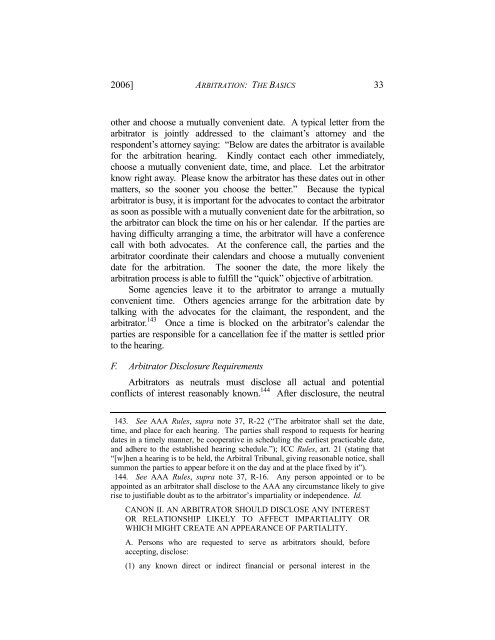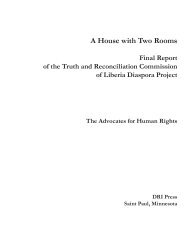2006/Vol. 5 No.1 - Hamline Law - Hamline University
2006/Vol. 5 No.1 - Hamline Law - Hamline University
2006/Vol. 5 No.1 - Hamline Law - Hamline University
Create successful ePaper yourself
Turn your PDF publications into a flip-book with our unique Google optimized e-Paper software.
<strong>2006</strong>] ARBITRATION: THE BASICS 33<br />
other and choose a mutually convenient date. A typical letter from the<br />
arbitrator is jointly addressed to the claimant’s attorney and the<br />
respondent’s attorney saying: “Below are dates the arbitrator is available<br />
for the arbitration hearing. Kindly contact each other immediately,<br />
choose a mutually convenient date, time, and place. Let the arbitrator<br />
know right away. Please know the arbitrator has these dates out in other<br />
matters, so the sooner you choose the better.” Because the typical<br />
arbitrator is busy, it is important for the advocates to contact the arbitrator<br />
as soon as possible with a mutually convenient date for the arbitration, so<br />
the arbitrator can block the time on his or her calendar. If the parties are<br />
having difficulty arranging a time, the arbitrator will have a conference<br />
call with both advocates. At the conference call, the parties and the<br />
arbitrator coordinate their calendars and choose a mutually convenient<br />
date for the arbitration. The sooner the date, the more likely the<br />
arbitration process is able to fulfill the “quick” objective of arbitration.<br />
Some agencies leave it to the arbitrator to arrange a mutually<br />
convenient time. Others agencies arrange for the arbitration date by<br />
talking with the advocates for the claimant, the respondent, and the<br />
arbitrator. 143 Once a time is blocked on the arbitrator’s calendar the<br />
parties are responsible for a cancellation fee if the matter is settled prior<br />
to the hearing.<br />
F. Arbitrator Disclosure Requirements<br />
Arbitrators as neutrals must disclose all actual and potential<br />
conflicts of interest reasonably known. 144 After disclosure, the neutral<br />
143. See AAA Rules, supra note 37, R-22 (“The arbitrator shall set the date,<br />
time, and place for each hearing. The parties shall respond to requests for hearing<br />
dates in a timely manner, be cooperative in scheduling the earliest practicable date,<br />
and adhere to the established hearing schedule.”); ICC Rules, art. 21 (stating that<br />
“[w]hen a hearing is to be held, the Arbitral Tribunal, giving reasonable notice, shall<br />
summon the parties to appear before it on the day and at the place fixed by it”).<br />
144. See AAA Rules, supra note 37, R-16. Any person appointed or to be<br />
appointed as an arbitrator shall disclose to the AAA any circumstance likely to give<br />
rise to justifiable doubt as to the arbitrator’s impartiality or independence. Id.<br />
CANON II. AN ARBITRATOR SHOULD DISCLOSE ANY INTEREST<br />
OR RELATIONSHIP LIKELY TO AFFECT IMPARTIALITY OR<br />
WHICH MIGHT CREATE AN APPEARANCE OF PARTIALITY.<br />
A. Persons who are requested to serve as arbitrators should, before<br />
accepting, disclose:<br />
(1) any known direct or indirect financial or personal interest in the
















